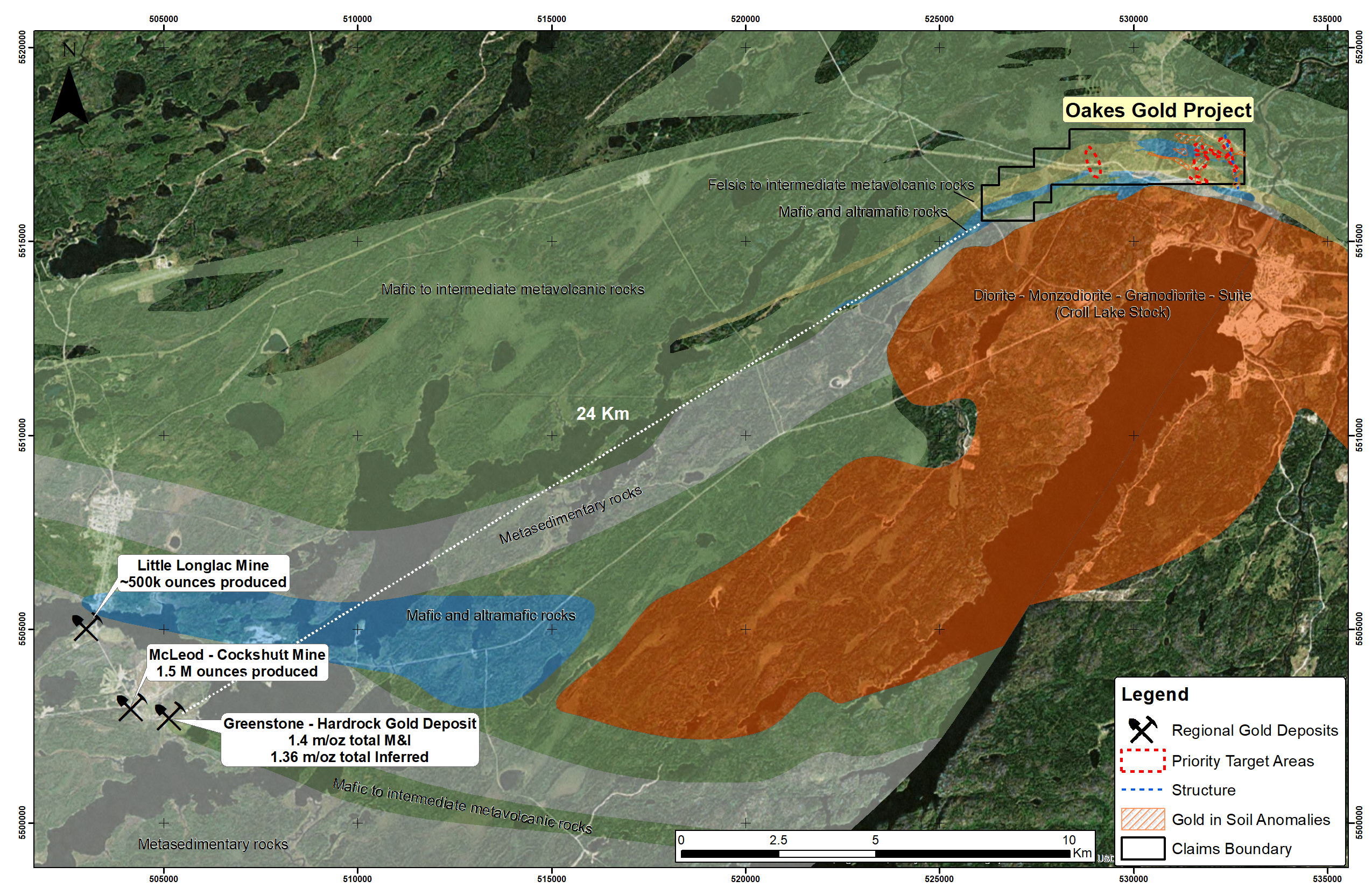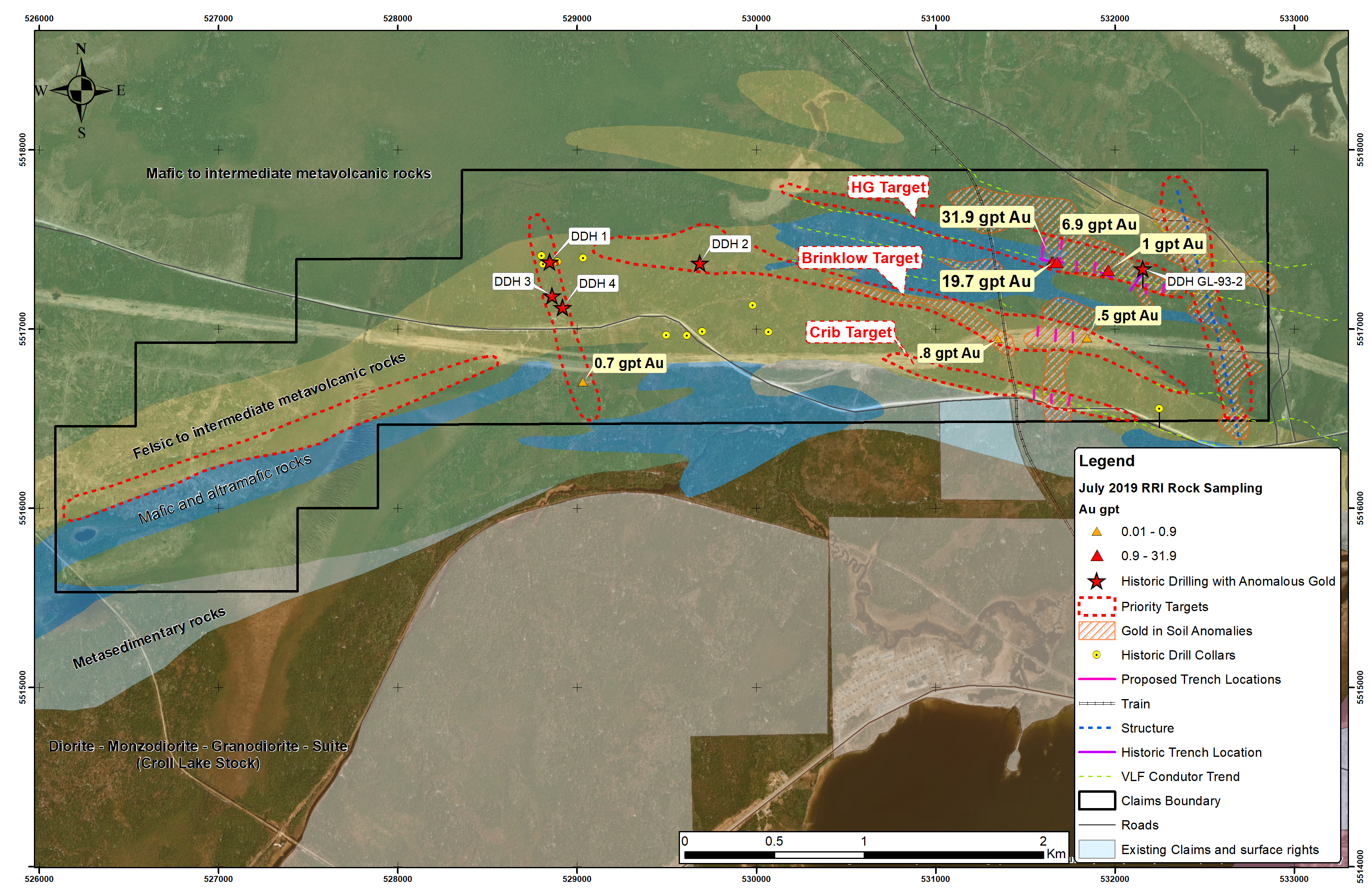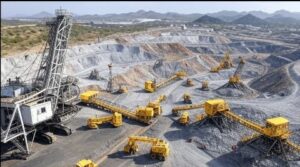July 29, 2019 – Vancouver, BC: Riverside Resources Inc. (“Riverside” or the “Company”) (TSX-V: RRI) (OTCQB: RVSDF) (FSE: R99), is pleased to report that the Company has staked and acquired the Oakes Gold Project (the “Project”) located in northwestern Ontario. Riverside’s initial sampling at the Oakes Project returned three high-grade surface samples from an area stripped in 2010. Two of the five samples taken from this trench returned 19.7 g/t and 31.9 g/t gold. Another sample 30 m along strike to the east returned 6.9 g/t gold. These initial results demonstrate the high-grade discovery potential for the Project. Preliminary prospecting and mapping work has traced the known quartz-carbonate vein beyond the high-grade sample location over a strike length of 400 m, and historical surveys and field observations indicate that this target may extend over a strike length of up to 2 km.
The Oakes Project is located in the Oakes Township just north of Canadian National Highway 11 and about 2 km north of the town of Long Lac, Ontario. The Oakes Township covers part of the well-endowed Beardmore-Geraldton Greenstone Belt region, located northeast of Thunder Bay, Ontario. Riverside’s exploration team is exploring for orogenic gold mineralization hosted in large shear zones in the area, and plans to complete additional mapping, sampling and survey work in the coming months. Access is considered excellent, with year-round paved and gravel roads to support survey and drilling work during all seasons.
Riverside’s President and CEO, John-Mark Staude, stated: “The Oakes Project is the first project Riverside’s generative team has staked in western Ontario and the Company plans to continue diversifying its portfolio with further Canadian gold prospects when high-quality acquisition opportunities present themselves. Adding Canadian assets to our portfolio expands our prospective partner network further, with access to flow-through financing and other exploration tax credit programs. We are pleased with the greater than 20 g/t gold assay results from our initial work at the Oakes Project and plan to follow up these positive results with more mapping, sampling and survey work in 2019. Our aim is to define compelling drill targets to attract quality partnerships and provide our shareholders with additional discovery opportunities.”
Regional History:
The Geraldton region has a long and rich mining history and has produced 4.1 million ounces of gold over the past 100 years including the combined MacLeod-Cockshutt Mine, which produced 1.5 million ounces of gold up to 19701. More recently, the Hardrock Project held by Greenstone Gold Mines (jointly owned by Centerra Gold and Premier Gold Mines) has elevated attention to the area by announcing their intention to mine their gold resource near Geraldton, Ontario. The Hardrock Project mineral resources include: 1.4 million measured and indicated ounces and 1.36 million inferred ounces of gold2 (see Figure 1 below).

Figure 1: Oakes Project with regional geology and distance from large nearby gold deposits
The Oakes Project is located 20 kilometers from the past producing Long Lac Gold Mine and Greenstone Gold’s Hardrock Deposits at Geraldton, Ontario.
Riverside’s Exploration Work:
Riverside’s first phase of work included 29 rock samples taken from both outcrops and old trenches (see Figure 2below). The recent work confirmed three previously identified areas and three additional target zones. There are two predominant target orientations one which trends east-west and is associated with contact zones that have been delineated by VLF (Very Low-Frequency) and IP (Induced Polarization) chargeability geophysical surveys; and a second target zones trend at 340 degrees north-west that is defined by linear magnetic lows, field geology and soil geochemistry. The past magnetic surveys conducted by previous operators is also helpful in outlining diabase dikes and geological contacts where overburden masks the underlying bedrock. Most of the old drill collars could not be located in the field, but sampling of silicified and mineralized outcrop in the general area of the old drill collars returned anomalous (0.5-1.0 g/t) results for gold, suggesting the right geological environment and rationale for the historical drilling. Riverside’s sampling program focused on the soil anomalies and trenches conducted by Golden Chalice Resources in 2010-12.
Targets:
Riverside’s first-phase exploration program defined several target areas for follow-up survey work and drill target refinement (see Figure 2 below). The target areas were delineated by past geophysical and geochemical survey work and confirmed by Riverside’s sampling program completed in July.

Figure 2: Oakes Project showing project Geology and Riverside’s target areas with historic geochemical anomalies and drill hole locations
HG Target:
Trench #1 in particular showed several shears, the largest being 3 m wide and exposed over an 80 m long strike within the trench. Two quartz-carbonate shears were sampled by Riverside in Trench #1. These shears are within mafic volcanic bedrock with sulphide mineralization primarily pyrrhotite and pyrite. Two of the five samples taken from this trench returned 19.7 and 31.9 g/t gold (see Figure 2 above). Another sample 30 m to the east returned 6.9 g/t gold and an additional sample 275 m along trend returned 1 g/t gold. These Riverside samples are on trend with drill hole GL-93-2, drilled by Greater Lenora Resources Corp. in 1993 which returned >3 g/t gold within sheared metavolcanics rocks. Riverside believes this drill intercept and the trench samples demonstrate a 400 m strike length for the HG Target that could extend, based on interpretation of geology and geophysics for 2 km in total strike length, which will be confirmed with follow up field exploration studies.
Brinklow Target:
Similar parallel targets were delineated to the south of the HG Target. These zones are oriented roughly east-west and coincident with VLF, IP chargeability and soil geochemistry anomalies. The Brinklow zone may align with the historical hole DDH50-013 which intersected anomalous gold (>3 g/t) within mafic volcanics at only 7.6 m downhole.
Crib Target:
The southernmost target extends from the pipeline right-of-way to the southeast corner of the Project and is located along the boundary of mafic volcanic and pillow basalts that also coincides with a VLF and partial soil anomaly.
Two other N-NW trending targets were also identified. One of these targets is identified by historical drill holes #1, #3 and #4, which all returned anomalous gold intercepts >3 g/t gold4. One grab sample by Riverside south and on trend from these holes returned anomalous gold (0.7 g/t) and may define another target area. The trend of this zone is the same as another zone identified near the eastern boundary. This ‘eastern structure’ target is delineated by a strong linear magnetic low, interpreted as a fault, and a large, coincident north-south trending gold in soil anomaly.
Project History:
Past work on the Oakes Project included two (2) drill campaigns, more recent VLF, Mag and IP geophysics in addition to a soil chemistry survey and trenching campaigns. Historical drilling by Hard Rock Gold Mines included seven (7) short, BQ-sized holes drilled between 1949-1951. Five of the drill holes from the 1950s intersected gold grades above 3 g/t5. Only a few select pieces of core from these past programs are available such that the old work will need to be confirmed and incorporated into new work being conducted by Riverside to produce bonified exploration targets. Drill logs report the mineralized zones that were sampled historically comprised quartz-carbonate veins within sheared mafic volcanics with sulphide mineralization (pyrite, chalcopyrite and galena). This drilling campaign was conducted to trace known veins discovered at surface.
The two holes drilled in 1993 by Greater Lenora Resources Corp. were located to test two coincident VLF and soil geochemical anomalies. Drill logs from the historical reports show the mineralized zones that were sampled comprised meta-basalts (greenschist to amphibolite facies) and tuffs showing silicification and sulphide mineralization (pyrite, chalcopyrite and pyrrhotite). Hole GL-93-1 was drilled to a depth of 153 m and returned anomalous results in gold and copper. Hole GL-93-2 (155 m) intersected an 8.3 m length of semi-massive pyrrhotite mineralization starting at 112m down hole with one, 1.5 m long sample returning 3.3 g/t gold. The emphasis of this exploration appears to have been exploring for copper.
More recent work by Golden Chalice (2010-12) includes an IP survey and a trenching campaign. The trenching campaign identified several mineralized shears coincident with IP chargeability and VLF geophysical anomalies. The best trench of six, Trench #1, returned three channel samples of 4.77, 4.17 and 3.41 g/t gold within shear-hosted quartz-carbonate veins. In addition, 26% of the 20 samples taken at Trench #1 returned greater than 1 g/t gold. The best composite sample results from this older work in Trench #1 were 1.3 g/t over 4 m and 1.32 g/t over 4 m. None of the trench work has been followed-up on and most of the complimentary geochemical anomalies have not been drilled. Riverside sees ample opportunity at the Oakes Project to further consolidate the past work and build on the survey work that has showed positive results for gold so far.
Qualified Person & QA/QC:
The scientific and technical data contained in this news release pertaining to the Oakes Project was reviewed and approved by Freeman Smith, P.Geo, a non-independent qualified person to Riverside Resources, who is responsible for ensuring that the geologic information provided in this news release is accurate and who acts as a “qualified person” under National Instrument 43-101 Standards of Disclosure for Mineral Projects.
The rock samples collected by Riverside’s field crew at the Oakes Project included grab samples of mineralized outcropping rock consisting of composites of bedrock fragments rock-sawed or hammer-chipped from 0.3 and 1.0-metre-long intervals across rock faces showing evidence of shearing and silicification. All of Riverside’s rock samples were processed in Thunder Bay, Ontario at AGAT Labs where gold content was determined by fire assay with atomic adsorption finish and ICP-mass spectrometry for 32 other elements.
Regarding previous historical operators work on the Oakes Project. The reliability of historical data is uncertain but is considered to be relevant by Company management as a portion of the historical sampling was resampled and verified; however, there is a risk that the Company’s confirmation work or future drill testing may produce results that substantially differ from the historical results.
About Riverside Resources Inc.:
Riverside is a well-funded exploration company driven by value generation and discovery. The Company has no debt and fewer than 63M shares outstanding with a strong portfolio of gold-silver and copper assets in North America. Riverside has extensive experience and knowledge operating in Mexico and leverages its large database to generate a portfolio of prospective mineral properties. In addition to Riverside’s own exploration spending, the Company also strives to diversify risk by securing joint-venture and spin-out partnerships to advance multiple assets simultaneously and create more chances for discovery. Riverside has additional properties available for option, with more information available on the Company’s website at www.rivres.com.
ON BEHALF OF RIVERSIDE RESOURCES INC.
“John-Mark Staude”
Dr. John-Mark Staude, President & CEO
For additional information contact:
| John-Mark Staude President, CEO Riverside Resources Inc. info@rivres.com Phone: (778) 327-6671 Fax: (778) 327-6675 Web: www.rivres.com | Raffi Elmajian Corporate Communications Riverside Resources Inc. relmajian@rivres.com Phone: (778) 327-6671 TF: (877) RIV-RES1 Web: www.rivres.com |
Certain statements in this press release may be considered forward-looking information. These statements can be identified by the use of forward-looking terminology (e.g., “expect”,” estimates”, “intends”, “anticipates”, “believes”, “plans”). Such information involves known and unknown risks — including the availability of funds, the results of financing and exploration activities, the interpretation of exploration results and other geological data, or unanticipated costs and expenses and other risks identified y Riverside in its public securities filings that may cause actual events to differ materially from current expectations. Readers are cautioned not to place undue reliance on these forward-looking statements, which speak only as of the date of this press release.
Neither the TSX Venture Exchange nor its Regulation Services Provider (as that term is defined in the policies of the TSX Venture Exchange) accepts responsibility for the adequacy or accuracy of this release.
Original Article: https://www.rivres.com/news/2019-news/riverside-expands-into-canada-staking-new-high-grade-gold-project

















